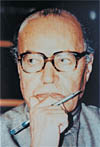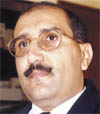Saleh O. Abdulakrim: “There are only 7 doctors serving a population of 450,000!” [Archives:1998/27/Interview]
Staff Brigadier Saleh Obadi Abdulkarim is the Director of the Yaffa’ Directorate in the Governorate of Lahaj. Graduating from the military academy in Cairo, 1965, Abdulkarim, 48, specialized in armored vehicles. He took part in defending the revolutions in both the northern and southern parts of Yemen. He fiercely fought the British occupation of Aden right up to independence day on 30 November, 1967.
Since he was appointed as the Director of Yaffa’ in 1997, Abdulkarim has been in an up-hill struggle to provide the most basic of public services for this rather deprived region of Yemen.
Mohammed Bin Sallam of Yemen Times discussed with Mr. Saleh Abdulkarim some of the most pressing issues that concern Yaffa’ and its inhabitants. He filed the following interview.
Q: Could you tell us a bit about the current situation in Yaffa’ regarding the provision of basic public services?
A: Frankly speaking, Yaffa’ is deprived of almost all of the necessary public service. This situation has persisted since before the revolution. Successive governments had nothing to speak of. It is true that Yaffa’ is remote and lies in a very rough terrain, but this is not an excuse for neglecting it.
Following the unification of Yemen in 1992, public projects started to gradually come into Yaffa’. People started building roads in cooperation with NGOs and Yemeni immigrants working abroad.
The President has directed that Yaffa’ should be connected by roads with Al-Baidha and other Yemeni towns and cities. It is still a dirt road that needs to be paved.
Yaffa’ is also in urgent need of water supply projects. The project that was started in 1992 with an estimated cost of $70 million, most of which provided through foreign aid, stopped half way through and was never completed. All our efforts, to finish this project and find out where all the money has gone, came to nothing. Even when completed, this project will only cover the needs of parts of Yaffa’. The city needs more regulated water supply.
On another level, a number of dams are being constructed in the valleys to trap rain water of agricultural purposes, especially coffee beans and fruits. We also aim to extend electricity lines from the intended electricity generating project financed by the German government in the Habilain area, as promised by the Ministry of Electricity.
Q: When did the government officials start paying attention to Yaffa’s needs?
A: Since I assumed my post I made extensive efforts to put Yaffa’ on the map. The President directed senior government officials to visit the area in order to get first-hand knowledge of its needs.
To start executing any project, you have to make every possible effort to make it a reality.
Q: How good are the health services in Yaffa’?
A: Health services in general and primary health care in particular are very bad. There are only 7 doctors serving a population of 450,000! Although there are 4 major hospitals and 28 health care units, there is not enough staff to properly manage them.
Moreover, to add insult to injury, corruption is quite rife in this very vital sector. A good amount of the medicines and other medical supplies regularly sent to the governorate does not reach its final destination, the hospital for which they are intended. As a result of that, people find themselves having to go Aden to obtain the necessary medicines. Some of them go Al-Naqib hospital, which, although well-equipped, can only cope with 5% of the cases in the directorate.
Yemenis working abroad usually send some medical supplies, but they cannot really keep up with the increasing demand, not to speak of corruption and medicine plundering.
Q: What have you done to combat corruption in the medical sector?
A: Reform committees were organized to look into financial and administrative irregularities. They came out with a number of preliminary findings that will be employed in a more comprehensive reform process.
These reform committees not only restrict themselves to the health sector, but also act in other sectors where corruption is suspected.
Some of the corrupt officials are from Yaffa’ itself, who were put in their current posts for political reasons – to spite people from other parties.
Q: Are the sanitation and sewerage systems any good?
A: Lack of proper sanitation and sewerage systems has led to the widespread of diseases and epidemics. This has to do with the restriction of city expansion and a lessening in its trade and industrial potential.
Q: What about telephone lines?
A: The Ministry of Communications is currently implementing a program to supply the Yaffa’ with 2,000 telephone lines now and a further 2,500 in the next few years.
Q: Now could you tell us briefly about another very important issue – the judicial and security systems?
A: Both these systems, unfortunately, are rather backward. We really rely on the citizens’ awareness and their sense of responsibility and law-abiding. Otherwise, security is quite weak in this area. Out of the 450 police officers and constables that should be working in Yaffa’, there are only 6!
As for the judicial system, there is only one judge in the whole of Yaffa’, who has to deal with numerous and complicated court cases. Hence, great delays and backlogs are experienced by the citizens.
Q: Are there many blood revenge cases in Yaffa’?
A: All the citizens in Yaffa’ (independent, partisan, public officials, tribal sheikhs, etc.) have agreed on and signed several pledges in many people’s gatherings and meetings to renounce blood revenge. This has become a fixed principle, to which almost all the people in Yaffa’ adhere.
Q: What public projects are being implemented in Yaffa’?
A: There are several projects that will be completed and inaugurated during the September and October celebrations. A 12-department college of education will be opened. It was funded by Sheikh Omar Qassem Al-Aisa’i, the well-known Arab philanthropist who paid YR 70 million, and other benevolent businessmen from Yaffa’. Studies will start in this college at the beginning of next September.
Other projects that need to be urgently started must include road building. This is essential for facilitating an easy access to the city, if we want to attract investors to the area.
Q: How many Yaffa’ people are working abroad, and how much money do they send back home?
A: There are more that 700,000 people who originally came from Yaffa’ and immigrated to various parts of the world – Malaysia, Indonesia, UK, US, the Gulf, etc.
They make big contributions towards building and developing their old country. About 90% of the buildings and institutions currently standing were financed by Yemeni immigrants.
By some estimates, the total amount of money remittances sent every year by these immigrants exceeds $ 1 billion, which includes money sent to their families and money donated for various projects and charitable causes.
Q: What are the major sources of revenue in Yaffa’?
A: Yaffa’ is well known for its excellent coffee bean crop, which is the major source of cash coming into the area, followed by cereals, fruits and vegetables. Yaffa’ coffee is exported to various worldwide destinations.
There 57 fertile coffee-producing valleys in Yaffa’. Coffee growing is actually increasing in this part of Yemen. Farmers are very particular and determined not to replace coffee with qat, like what is happening in other parts of Yemen. Coffee can become a major source of national revenue.
Q: Now let’s move to another thorny subject, namely education. What sort of problems does the educational system in Yaffa’ suffer from?
A: There are 138 schools, 3,000 teachers, and 43,000 students – male and female at all levels. There are also a few small schools in remote areas, 90% of which were built by immigrants from Yaffa’. and other local philanthropists.
There are several groups and associations that these immigrants belong to, which try to channel funds and assistance into their old home town to help their fellow citizens.
Q: Yaffa’ has many interesting archeological sites and historical edifices and monuments. Why have these places not been exploited as tourist destinations?
A: Lack of properly paved roads and other infrastructure is a major hindrance in this respect. Hopefully, by next year the intended road from Al-Baidha will be completed. More funds are being pledged by investors and businessmen interested in the area.
Sheikh Al-Aisa’i has also pledged to pave the 30 km-long road leading to Wadi Banaa where there are hot springs or sulfur baths, which are renowned for their healing powers. Sheikh Al-Aisa’i has also expressed his willingness to renovate one of the main hospitals, and to build vocational and technical institute in Yaffa’.
I can say that most of public service projects in Yaffa’ will be finished within the next 4 years.
Q: What other future projects do you hope to implement in Yaffa’?
A: We are all working as best as we can to make Yaffa’ a better place, irrespective of any political allegiances and partisan affiliations.
——
[archive-e:27-v:1998-y:1998-d:1998-06-06-p:./1998/iss27/intrview.htm]


